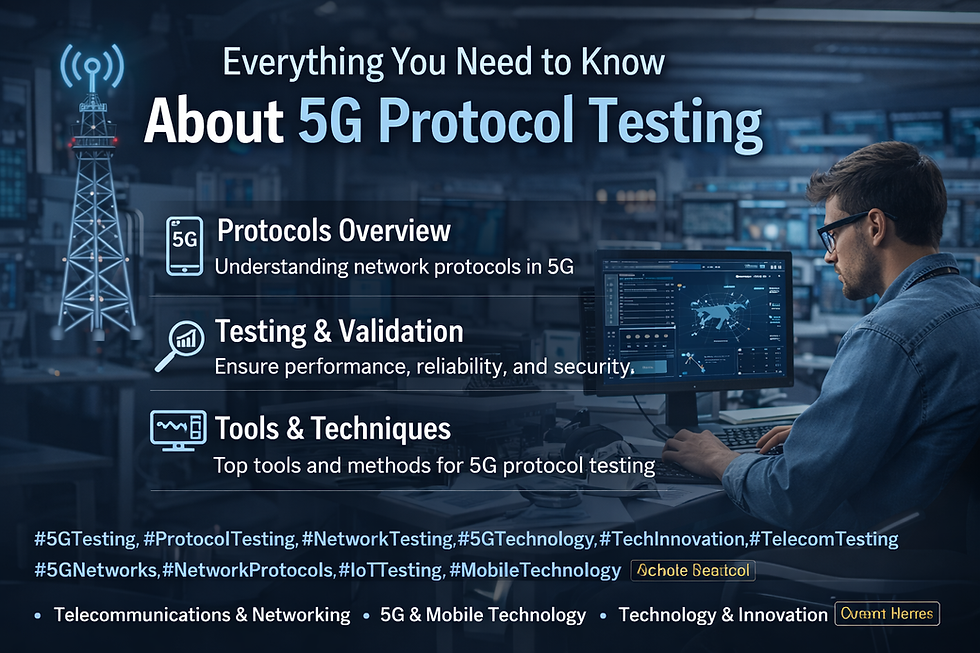The Rise of 5G Telco Cloud in 2024
- Sameer Krishn
- Jun 24, 2024
- 4 min read

Introduction
As we step into 2024, the technological landscape is being revolutionized by the advent of 5G Telco Cloud. This synergy of 5G technology and cloud computing is set to redefine connectivity, enhance data management, and unlock unprecedented opportunities across various industries. The impact of this convergence is profound, promising not only faster and more reliable internet but also enabling innovations that were previously unimaginable. This blog explores the rise of 5G Telco Cloud, its implications for 2024, and what you need to know to stay ahead in this rapidly evolving domain.
Table of Contents
Understanding 5G Telco Cloud
Benefits of 5G Telco Cloud
Impact on Various Industries
Challenges and Solutions
Future Trends in 5G Telco Cloud
Conclusion
Understanding 5G Telco Cloud
What is 5G Telco Cloud?
5G Telco Cloud represents the convergence of fifth-generation mobile networks (5G) and cloud computing. This integration enables the delivery of advanced services through high-speed, low-latency networks, supported by scalable and flexible cloud infrastructure. 5G Telco Cloud leverages the capabilities of both technologies to provide enhanced connectivity, faster data processing, and robust data storage solutions.
The Technology Behind 5G Telco Cloud
The backbone of 5G Telco Cloud consists of advanced technologies such as Network Function Virtualization (NFV) and Software-Defined Networking (SDN). NFV allows network functions to be virtualized and run on standard servers instead of dedicated hardware, increasing flexibility and reducing costs. SDN, on the other hand, separates the network control plane from the data plane, enabling centralized management and automation of network services. These technologies, combined with edge computing, ensure that data is processed closer to its source, reducing latency and improving performance.
Benefits of 5G Telco Cloud
Enhanced Connectivity and Speed
One of the most significant advantages of 5G Telco Cloud is its ability to provide enhanced connectivity and unparalleled speed. With data transfer rates up to 100 times faster than 4G, 5G networks enable real-time communication and seamless streaming of high-definition content. This increased speed is crucial for applications such as augmented reality (AR), virtual reality (VR), and ultra-high-definition video streaming.
Improved Data Management and Security
5G Telco Cloud also brings substantial improvements in data management and security. By leveraging cloud infrastructure, organizations can store and process large volumes of data efficiently. Additionally, the decentralized nature of cloud computing, combined with the security protocols of 5G networks, ensures robust data protection. Encryption and advanced authentication methods further safeguard sensitive information, making 5G Telco Cloud a reliable solution for industries with stringent security requirements.
Impact on Various Industries
Healthcare
The healthcare industry stands to benefit immensely from the adoption of 5G Telco Cloud. The combination of high-speed connectivity and cloud computing enables telemedicine services, remote patient monitoring, and real-time data sharing among healthcare providers. This not only improves patient outcomes but also reduces the burden on healthcare facilities. For example, doctors can perform remote consultations and access patient records instantly, facilitating timely and informed decision-making.
Manufacturing
In the manufacturing sector, 5G Telco Cloud facilitates the implementation of smart factories. With real-time monitoring and control of production processes, manufacturers can optimize operations, reduce downtime, and increase efficiency. The use of IoT devices connected via 5G networks allows for predictive maintenance, ensuring that machinery is serviced before failures occur, thus minimizing disruptions.
Retail and E-commerce
Retail and e-commerce businesses are also poised to leverage the benefits of 5G Telco Cloud. Enhanced connectivity enables seamless online shopping experiences, faster transaction processing, and real-time inventory management. Additionally, augmented reality (AR) applications can provide customers with immersive shopping experiences, allowing them to visualize products in their own environment before making a purchase.
Challenges and Solutions
Infrastructure and Implementation Challenges
Despite its numerous benefits, the implementation of 5G Telco Cloud is not without challenges. The deployment of 5G infrastructure requires significant investment in new hardware, including base stations and antennas. Additionally, the integration of cloud services necessitates upgrades to existing IT infrastructure. To address these challenges, governments and private sector stakeholders must collaborate to develop comprehensive deployment strategies and ensure adequate funding.
Regulatory and Security Concerns
Regulatory and security concerns also pose significant hurdles to the widespread adoption of 5G Telco Cloud. Data privacy regulations vary across regions, complicating cross-border data transfers and storage. Moreover, the increased connectivity and data flow associated with 5G networks create more potential entry points for cyberattacks. To mitigate these risks, policymakers and industry leaders must work together to establish uniform regulations and robust security frameworks.
Future Trends in 5G Telco Cloud
Integration with AI and IoT
The future of 5G Telco Cloud will be characterized by its integration with artificial intelligence (AI) and the Internet of Things (IoT). AI algorithms can analyze the vast amounts of data generated by IoT devices, providing valuable insights and enabling automated decision-making. This integration will drive innovations in various sectors, including smart cities, autonomous vehicles, and industrial automation.
The Path to 6G
While 5G is still in its early stages, research and development efforts are already underway for the next generation of mobile networks, known as 6G. 6G is expected to offer even higher speeds, lower latency, and greater capacity than 5G. The transition to 6G will further enhance the capabilities of the Telco Cloud, enabling new applications and services that we can only begin to imagine today.
Conclusion
Recap of Key Points
The rise of 5G Telco Cloud in 2024 marks a significant milestone in the evolution of communication and data technologies. By combining the speed and connectivity of 5G with the scalability and flexibility of cloud computing, 5G Telco Cloud offers unparalleled benefits across various industries. Enhanced connectivity, improved data management, and robust security are just a few of the advantages that make this technology transformative.
Preparing for the Future
As we move forward, it is essential for businesses, policymakers, and individuals to understand the potential of 5G Telco Cloud and prepare for its widespread adoption. Investing in infrastructure, addressing regulatory challenges, and fostering innovation will be crucial in realizing the full potential of this technology. At Apeksha Telecom, we provide comprehensive training programs to equip professionals with the skills needed to navigate the complexities of 5G Telco Cloud. Our commitment to 100% placement ensures that our students are well-prepared to thrive in this dynamic and rapidly evolving field.
Internal URLs:
Apeksha Telecom's training programs: https://www.apekshatelecom.com/training
Apeksha Telecom's placement assistance: https://www.apekshatelecom.com/placement-assistance
External URLs:
Telecom Gurukul: https://www.telecomgurukul.com
Reference URLs:
"The Rise of 5G Telco Cloud in 2024" - Apeksha Telecom: https://www.telecomgurukul.com/post/the-rise-of-5g-telco-cloud-in-2024




Comments